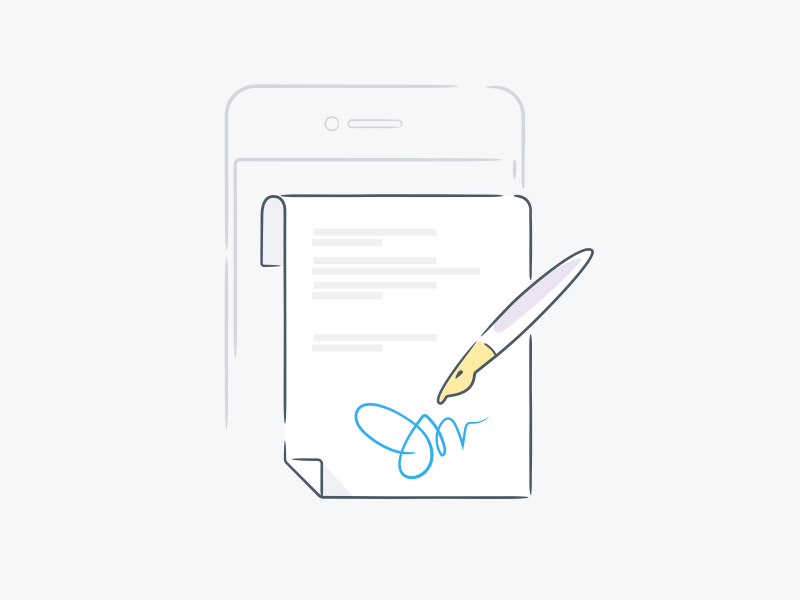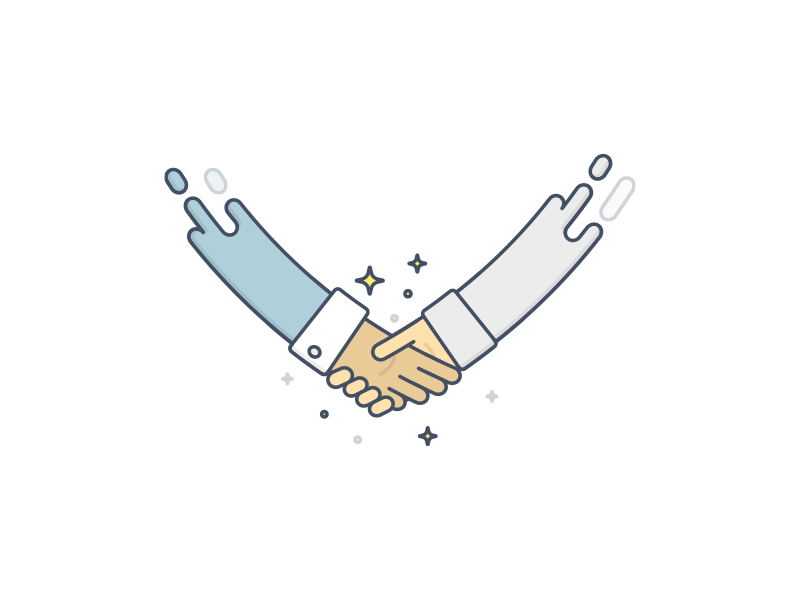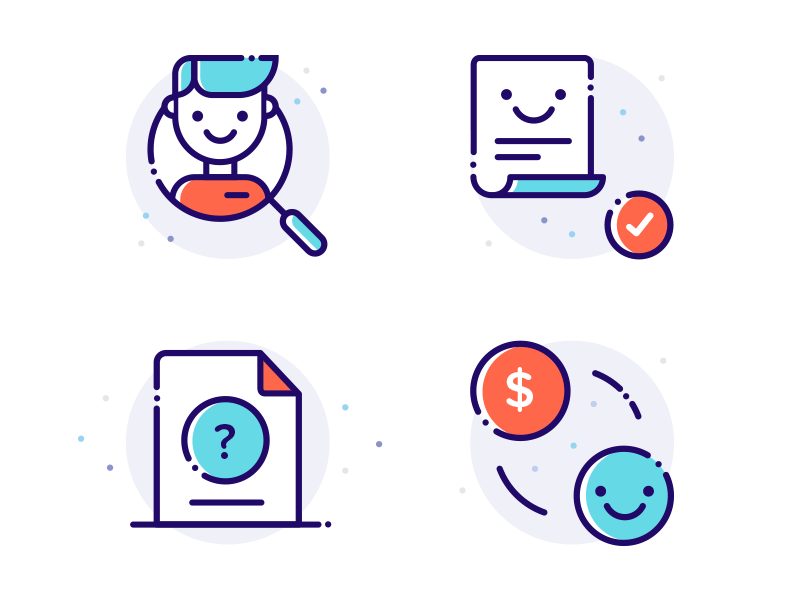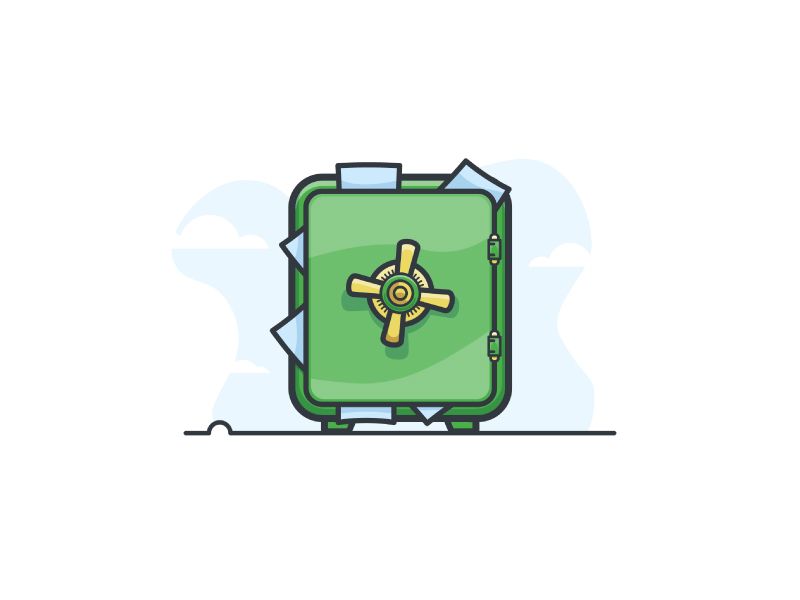Do I Need an NDA for App Development (With Template)?
Published: May 2, 2022
7 min read
In this article, you'll learn:
1
ℹ️ Non-Disclosure Agreement For a Mobile App: FAQ
2
✅ Top 5 Reasons to Sign a Non-Disclosure Agreement for App Development
3
🔐 The General Data Protection Regulation
4
📝 Our Template
5
💡 Conclusion
Let’s be honest from the very beginning. Signing a Non-Disclosure Agreement for app development is one of the controversial issues in the mobile industry: while some say that it’s a must-do, others call it a dangerous and even harmful decision for your future business.

What is an NDA and do you need one? That's what we're about to find out (image by David de la Iglesia)
Today we’re going to share our own thoughts and experience on this matter. First, let’s start with figuring out what an NDA for app development is.
ℹ️ Non-Disclosure Agreement For a Mobile App: FAQ
Before we’ll share with you our NDA template for app development, let’s take a look at the most frequently asked questions and our answers to them.
Question # 1: What is an NDA?
The abbreviation NDA stands for the Non-Disclosure Agreement. Actually, this legal contract can be used in any sphere where the special protection of an intellectual property is needed.
The main purpose of the NDA for app development is to secure your idea, trade secrets and other confidential information that, if revealed to third parties, may lead to business losses.
Question # 2: With whom should I sign the Non-Disclosure Agreement for my mobile app?
The list of potential parties is quite big. In the broad sense, you have to sign the NDA with anyone who may have access to any confidential information regarding your mobile application development.

Image by Maciek Butscher
However, speaking more specifically, you should consider signing this legal contract with the following parties:
- Your own (in-house) team. If you have an in-house team that will be working on your project, they should be among the first to sign the NDA. As a rule of thumb, such an agreement protects not only from leaks outside but also prevents the spread of information among employees that aren’t working on this project.
- Contract developers. This is clear as day that the NDA signing with any external developers is a must-do for you. Pay attention: the non-disclosure of some project information should remain in force even after the product release.
- QA engineers (testers). Since those guys have access to the code and know some technical specifications of your application, it’s better to sign the mobile application development agreement with them as well.
- PO’s, PM’s, Designers and others who work on your product without using the code. Since they may have access to different blueprints, mindmaps, design features and other important data, they should sign an agreement too.
Question # 3: At what stage should I sign the NDA?
Some people aren’t sure when exactly they should sign the Non-Disclosure Agreement for their mobile app with people who are working on it.
The best moment is when you hire/sign the contract with a new employee.
However, it’s also possible to sign an NDA during the candidate interview stage if you’re going to reveal some confidential project details and want to keep them in secret.
Question # 4: Is there a single template?
Nope, there is no single template of the mobile application development agreement which would be generally recognized.
Usually, mobile app development companies offer their template. If the agency already has testimonials and cares about their reputation, they won’t hide any pitfalls in their template. Yet, you are free to offer your corrections and modification or even your own variant of the agreement.
You can also use the NDA template for app development by the Stormotion team. We’ll leave the link closer to the end of this article so read on!
Question # 5: What are the components of a good NDA?
Since there is no single form of the NDA, you should be careful when signing one. Why? So as not to miss something important!

Look at the table of must-have components below (image by Dmitri Litvinov)
Therefore, here is the table of must-have contents for you:
Clause | Description | |
|---|---|---|
Definition of the Confidential Information 🖊️ | In your mobile application development agreement you should specify what exactly constitutes confidential information and, thus, should be protected. | |
Parties 👥 | In addition to the definition of the Disclosing and the Recipient parties, the NDA should also clarify to whom the Recipient party is allowed to disclose the confidential information. For example, developers should be able to share some confidential tech information to the QA engineers, if needed. | |
Duration ⏱️ | A clearly defined timeframe is another must-have. Avoid unrealistic time limits. Usually, 1-3 (sometimes up to 5) years are enough. | |
Permitted Use of the Confidential Information 🔓 | Here you should specify when and how the Recipient party can and can’t use protected information. | |
Jurisdiction 👨⚖️ | Clearly define what court has jurisdiction in case your NDA for app development is violated. | |
Remedies 💶 | This clause includes the possible consequences of violating the agreement and acceptable remedies for the Disclosing party. | |
No Obligation 🚪 | Finally, you should include the article that allows terminating the relationship at any point if it isn’t against any relevant contractual stipulations or laws. | |
Tip: don’t set unrealistic penalties (like 50,000 euros) for the violation of your mobile application development agreement. The best option is to define that such cases will be simply regulated by law.
So, these were must-have elements of an NDA template for app development. Pay attention to them when you are signing your next agreement!
It seems that we answered the question “What is an NDA?” and now are ready to move to the reasons why you especially may need one.
✅ Top 5 Reasons to Sign a Non-Disclosure Agreement for App Development
Reason # 1: To Protect Your Trade Secrets 🤫
This kind of information is of an exceptional importance for your business. For example, this may be your own methods of doing things, specific working processes inside your company, marketing schemes, development/scaling strategies and so on.

First and foremost, an NDA is needed to protect your data (image by Adam Kozel)
Actually, your trade secrets are the most valuable kind of information for your business. A good Non-Disclosure Agreement for app development may prevent the disclosure of trade secrets and, thus, protect your business from competitors.
Reason # 2: To Secure More Specific Confidential Information 🔏
Except for the trade secrets, during the mobile app development you will have to reveal a lot of other confidential information. Its’ disclosure may not lead to such catastrophic consequences as a leak of trade secrets but still can cause you much trouble.
For example, confidential information can include passwords, customer lists, blueprints, devices and hardware configurations, prototypes etc.
Having an NDA adds the chances to avoid the leak of this information as well.
Reason # 3: To Minimize the Risk of Working with External Specialists 👩💻
If you’re cooperating with freelancers or development agencies, the NDA for app development is a must-have.
This is especially true for freelancers who often disappear in the middle of development without any warnings and can hardly be controlled. The legal obligations may increase their responsibility and prevent such unpleasant situations in the future.

When working with a freelancer, you have few guarantees (image by Toptal)
What about app development agencies? Usually, you don’t have problems with them.
First, agencies care about their reputation so they want to avoid any troubles even more than you.
Second, they may have their own business secrets that need to be protected. So don’t be surprised if they offer you to sign a mutual Non-Disclosure Agreement for app development that protects their confidential information as well.
Reason # 4: To Keep Your Project Hidden during Stealth Mode 🕴️
The Stealth Mode is a state of a company when it develops a product that is going to revolutionize the market but avoids public attention for the moment. This is often done due to marketing reasons (so as not to alert competitors and keep a “first-mover advantage”).
Therefore, the early leak of information about your product may destroy the whole strategy. And nothing helps better with keeping the information locked and safe rather than a NDA.
Reason # 5: To Protect Your Money 💵
Leaks of your trade secrets or other confidential information endanger your business. As a result, you can have your idea/project stolen and left without any funds.

An NDA can also protect your money (image by Warren Hoare)
So signing the Non-Disclosure mobile application development agreement is a step that you can take in advance to keep your money safe!
🔐 The General Data Protection Regulation
Since we’re talking about the data protection, we couldn’t help but mention EU’s new General Data Protection Regulation. It replaces the previous directive that was established in 1995.
First of all, your app should be in compliance with it. The new directive comes into force from May 25th, 2018.
Second, what does it have to do with your NDA?
Since the company (according to the GDPR) is obliged to store the data of users in secret, the contractor is also obliged to follow these rules and consider the same data confidential.
If needed, you can read more about the key changes of the new GDPR on the official website.
📝 Our Template
As we promised earlier, our Stormotion team prepared the NDA template for app development that you’re free to use.
You can check and download it here!
💡 Conclusion
So these were our insights on what an NDA is and how to sign one so as protect your business in advance!
Let’s briefly remember the main tips:
- Clearly specify what you consider as a confidential information (and don’t forget to include your trade secrets).
- Don’t set too long duration — 1-3 years are usually enough.
- Define which court will have the jurisdiction regarding your NDA for app development. Decide who will pay the legal fees. This is especially important if you’re cooperating with someone from another country.
- Don’t set unrealistic penalties — try to regulate possible remedies by law.
- Leave the option to terminate the agreement at any moment if it doesn’t violate the law.
Hope this article was useful! Any questions left? Hit the button below and we’ll help you!
Our clients say
![Stormotion client Pietro Saccomani, Founder from [object Object]](/static/40e913b6c17071a400d1a1c693a17319/b0e74/pietro.png)
They make the whole business work for us, and their improvements are fundamental to our operations. They’re reliable, honest, and willing to try new things that will help us. We appreciate how flexible and easygoing they are.
Pietro Saccomani, Founder
MobiLoud
Was it helpful?
Read also



